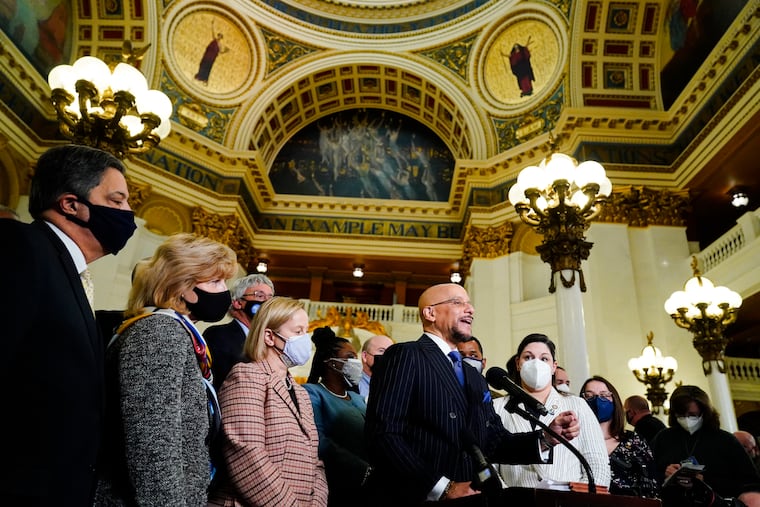The moral and constitutional imperative for investing in young people
Pennsylvania must spend budget surplus on schools.

With burgeoning resources in the commonwealth’s coffers, coupled with an evergreen moral (and constitutional) imperative, this year’s state budget must meaningfully and sustainably address years of continued disinvestment in our young people.
Just over two weeks ago, a white supremacist targeted a predominantly Black community in Buffalo, N.Y., killing 10 community members — a teacher, a bus aide, a community activist, and so many others who were deeply loved. And since that day, our nation has endured 33 mass shootings. Over the holiday weekend in Philadelphia, 13 people were murdered, including a 10-year-old boy and his father. Just over a week ago, we saw horror unfold at Robb Elementary School in Uvalde, Texas, where a gunman terrorized a community and stole the lives of 19 precious fourth graders and two beloved teachers. In both Buffalo and Uvalde, these acts were carried out by an 18-year-old with legal access to an assault rifle.
The crisis of gun violence is intolerable, and we continue to call for both local and national solutions, including commonsense gun reform. Further, both the gun violence crisis and the deadly COVID-19 pandemic have disproportionately affected Black and brown children and their families.
Decades of disinvestment in public education has also hurt Black and brown children. In 2022, communities are still deeply immersed in the fight for equity for our young people — and continue to be forced to justify resources that are seen as nonnegotiable in wealthier, whiter school districts. In fact, advocates have had to sue the commonwealth for its abject failure to meet its constitutional mandate to provide all of Pennsylvania’s children with a thorough and efficient system of public education.
In April, Pennsylvania’s revenues were the highest in its history. The state’s budget surplus now exceeds $8 billion. The commonwealth sits atop more than $2.8 billion in a rainy day fund. Further, after the passage of President Joe Biden’s historic American Rescue Plan, Pennsylvania maintains more than $2.2 billion in unspent federal funding. All told, Pennsylvania currently has in excess of $13 billion of surplus funding that it can and must spend to truly meet the needs of our schoolchildren. The governor and Democratic leadership in the state continue to prioritize our young people, and it’s time that the majority party do the same.
Year after year, we see the impact of this neglect. Just this week, our school infrastructure again failed our school communities as schools dismissed early amid sweltering conditions in school buildings. At Cassidy Elementary, now finally slated to be rebuilt, we heard from Chelsea Mungo, then in fourth grade, who asked State Sen. Vincent Hughes why the color of her skin determined the amount of school funding she and her peers received. At Francis Scott Key Elementary, fifth-grader Heron Uzima laid out his gratitude for the incredible teachers he’s had — and outlined exactly why the students at his school need and deserve so much more. As an English language learner, he shared how additional resources would help him thrive.
The fact that our young people have been compelled into advocacy because of our continued failure to invest in their futures is profoundly shameful. Educators, students, and parents in Philadelphia and across the country have been emphatic that our young people need more, and they need it now. There is legislation proposed that does just that.
State Sen. Hughes and Democratic leaders have put forth an achievable plan: a $3.75 billion investment in public education (the largest in the commonwealth’s history), including an $800 million commitment to remediating the lead, asbestos, and other toxins in our schools. The plan does not rely on smoke and mirrors — it relies on funding that exists today.
Investing just some of the commonwealth’s $13 billion in excess funding in our schools would move us toward equity. It would mean more comprehensive resources to address trauma and other mental health needs. It would mean lowering the counselor-to-student ratio to approach national recommendations. It would mean that we could end the crisis of toxic schools that jeopardizes the lives of students and staff every day. It would mean investments in gun violence prevention.
With our young people depending on us today for a chance at a better tomorrow, it is imperative that the state legislature show — not tell — our children that we value them. As State Sen. Hughes poignantly asked: If not now, when?
Jerry T. Jordan is president of the Philadelphia Federation of Teachers.